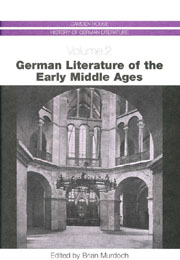Book contents
- Frontmatter
- Contents
- List of Illustrations
- Preface
- List of Abbreviations
- Introduction
- Into German: The Language of the Earliest German Literature
- Charms, Recipes, and Prayers
- Latin Prose: Latin Writing in the Frankish World, 700–1100
- Latin Verse
- Heroic Verse
- Otfrid of Weissenburg
- The Shorter German Verse Texts
- Historical Writing in and after the Old High German Period
- Late Old High German Prose
- Bibliography
- Notes on the Contributors
- Index
Latin Prose: Latin Writing in the Frankish World, 700–1100
Published online by Cambridge University Press: 05 February 2013
- Frontmatter
- Contents
- List of Illustrations
- Preface
- List of Abbreviations
- Introduction
- Into German: The Language of the Earliest German Literature
- Charms, Recipes, and Prayers
- Latin Prose: Latin Writing in the Frankish World, 700–1100
- Latin Verse
- Heroic Verse
- Otfrid of Weissenburg
- The Shorter German Verse Texts
- Historical Writing in and after the Old High German Period
- Late Old High German Prose
- Bibliography
- Notes on the Contributors
- Index
Summary
THE EARLY DEVELOPMENT of Germanic languages and literature has been much studied, even though the amount of surviving evidence on which to base such studies is quite limited. It must not be forgotten that the language of formal, official and academic communication was still predominantly Latin, and the volume of surviving Latin texts from this period exceeds that of the vernacular pieces many times over. The decline of the Roman Empire and the rise in power of the so-called barbarian tribes of northern and western Europe had resulted in a corresponding decline in the classical purity of the Latin language. In the western part of the Frankish empire it was becoming difficult to distinguish where Latin ended and the new local dialects began. The beginnings of modern Romance languages such as French, Italian, and Spanish can be traced back to this period. In the spoken language particularly the structures of classical Latin were being stretched to the limits. People on the western fringes of the Carolingian empire spoke a very different language from Latin used for writing, but at least they could see connections with their daily usage and follow the gist of texts read aloud. In the central and eastern areas, where Germanic dialects and languages prevailed, there was far less similarity between the languages of daily life and the classically inspired language of written records. Educated people in these realms needed to be bilingual if they were to operate equally well in spoken and written contexts.
- Type
- Chapter
- Information
- German Literature of the Early Middle Ages , pp. 73 - 86Publisher: Boydell & BrewerPrint publication year: 2004



